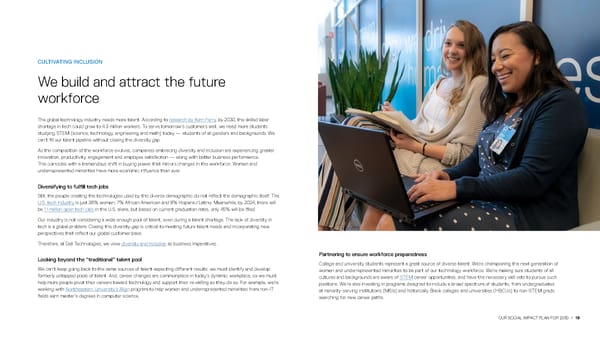CULTIVATING INCLUSION We build and attract the future workforce The global technology industry needs more talent. According to research by Korn Ferry, by 2030, the skilled labor shortage in tech could grow to 4.3 million workers. To serve tomorrow’s customers well, we need more students studying STEM (science, technology, engineering and math) today — students of all genders and backgrounds. We can’t fill our talent pipeline without closing the diversity gap. As the composition of the workforce evolves, companies embracing diversity and inclusion are experiencing greater innovation, productivity, engagement and employee satisfaction — along with better business performance. This coincides with a tremendous shift in buying power that mirrors changes in the workforce: Women and underrepresented minorities have more economic influence than ever. Diversifying to fulfill tech jobs Still, the people creating the technologies used by this diverse demographic do not reflect the demographic itself. The U.S. tech industry is just 36% women, 7% African American and 8% Hispanic/Latino. Meanwhile, by 2024, there will be 1.1 million open tech jobs in the U.S. alone, but based on current graduation rates, only 45% will be filled. Our industry is not considering a wide enough pool of talent, even during a talent shortage. The lack of diversity in tech is a global problem. Closing the diversity gap is critical to meeting future talent needs and incorporating new perspectives that reflect our global customer base. Therefore, at Dell Technologies, we view diversity and inclusion as business imperatives. Partnering to ensure workforce preparedness Looking beyond the “traditional” talent pool College and university students represent a great source of diverse talent. We’re championing the next generation of We can’t keep going back to the same sources of talent expecting different results; we must identify and develop women and underrepresented minorities to be part of our technology workforce. We’re making sure students of all formerly untapped pools of talent. And, career changes are commonplace in today’s dynamic workplace, so we must cultures and backgrounds are aware of STEM career opportunities, and have the necessary skill sets to pursue such help more people pivot their careers toward technology and support their re-skilling as they do so. For example, we’re positions. We’re also investing in programs designed to include a broad spectrum of students, from undergraduates working with Northeastern University’s Align program to help women and underrepresented minorities from non-IT at minority-serving institutions (MSIs) and historically Black colleges and universities (HBCUs) to non-STEM grads fields earn master’s degrees in computer science. searching for new career paths. OUR SOCIAL IMPACT PLAN FOR 2030 / 19
 Our Social Impact Plan for 2030 & Beyond Page 18 Page 20
Our Social Impact Plan for 2030 & Beyond Page 18 Page 20